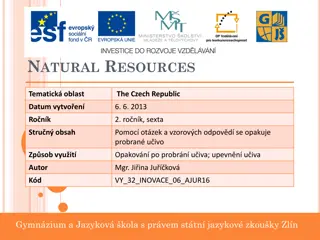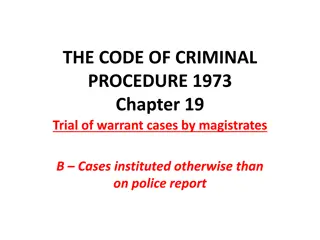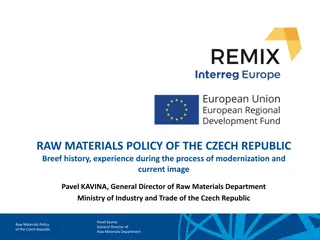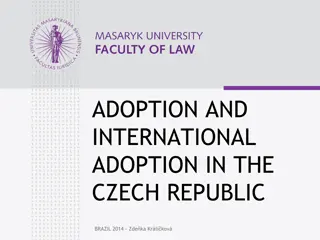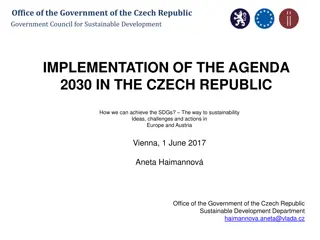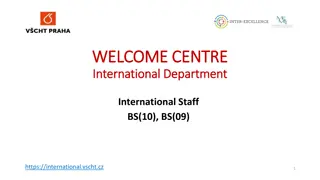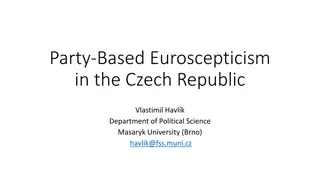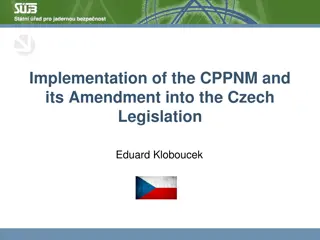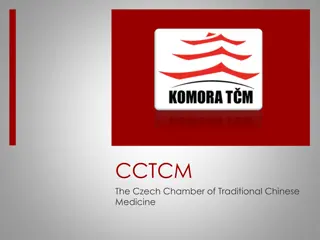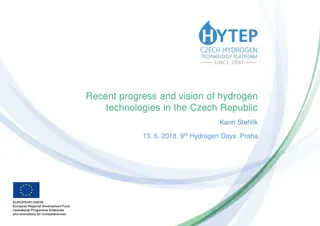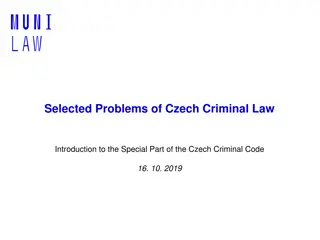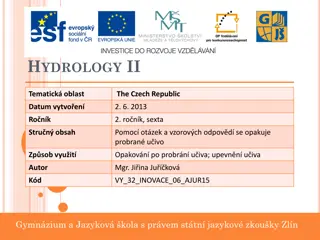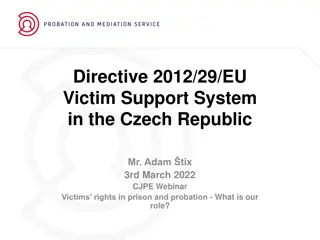Overview of Czech Criminal Procedure: Principles and Process
Czech criminal procedure combines inquisitorial and accusatorial models, with the pre-trial phase led by the public prosecutor and the trial phase overseen by a judge. Inspired by the Anglo-American adversarial system, Czech proceedings feature deviations tailored to the continental model. Key principles include due process, promptness, adequacy, restraint in rights interference, and the right to defense. Initiating proceedings follows principles of officiality, legality, and the accusatorial principle.
Download Presentation

Please find below an Image/Link to download the presentation.
The content on the website is provided AS IS for your information and personal use only. It may not be sold, licensed, or shared on other websites without obtaining consent from the author.If you encounter any issues during the download, it is possible that the publisher has removed the file from their server.
You are allowed to download the files provided on this website for personal or commercial use, subject to the condition that they are used lawfully. All files are the property of their respective owners.
The content on the website is provided AS IS for your information and personal use only. It may not be sold, licensed, or shared on other websites without obtaining consent from the author.
E N D
Presentation Transcript
INTRODUCTION TO THE CZECH CRIMINAL PROCEDURE: BASIC PRINCIPLES & STAGES OF CRIMINAL PROCEEDINGS 13thNovember 2019 Katar na Kandov
SOURCES Act no. 141/1961 Coll., on Criminal Procedure (CODE OF CRIMINAL PROCEDURE) Act no. 218/2003 Coll., on Juvenile Justice Act no. 418/2011 Coll., on Criminal Liability of Legal Entities and Proceedings against them Act no. 104/2013 Coll., on International Cooperation in Judicial Matters
CZECH CRIMINAL PROCEDURE reformed type of European continental proceedings obligatory formal preliminary proceedings combination of INQUISITORIAL (pre-trial phase) & ACCUSATORIAL (trial phase) model pre-trial phase dominated by public prosecutor assisted by police trial phase initiated by public prosecutor and consequent confrontation of parties (prosecution vs. defense) led by judge
CZECH CRIMINAL PROCEDURE inspiration from Angloamerican (adversarial) model of criminal proceedings diversions, agreement on guilt and punishment etc. but these elements are adjusted to continental model of criminal proceedings and its principles major differences Czech professional judges vs. Angloamerican jury Czech active judge vs. Angloamerican passive judge no formal burden of proof of public prosecutor in CR
BASIC PRINCIPLES OF CRIMINAL PROCEEDINGS
BASIC PRINCIPLES principles common for the whole process: DUE PROCESS prosecution on legal basis & in legal manner PROMPTNESS (principle of speed) periods in all stages of criminal proceedings ADEQUACY & RESTRAINT of interference with rights only in necessary cases & in necessary extent RIGHT TO DEFENSE formal and material defense
INITIATION PRINCIPLES Principle of OFFICIALITY law enforcement authorities have to proceed EX OFFO exceptions: consent of aggrieved party, remedies, Principle of LEGALITY public prosecutor is OBLIGED to prosecute all crimes exceptions: public prosecutor is authorized not to prosecute in certain cases (Section 172 par. 2) ACCUSATORIAL principle court proceedings may be initiated only on the basis of INDICTMENT (or motion for punishment or motion for approval of agreement on guilt and punishment)
PRINCIPLES OF EVIDENCE MATERIAL TRUTH establishing the merit of case BEYOND REASONABLE DOUBTS mere confession of defendant is not sufficient INVESTIGATIVE principle law enforcement authorities (including court) investigate ex offo all circumstances for and against defendant PRESUMPTION OF INNOCENCE in dubio pro reo FREE EVALUATION of evidence based on inner conviction of judge, not formal rules
PRINCIPLES TYPICAL FOR COURT PROCEEDINGS PUBLICITY public hearings before court vs. non-public pre-trial phase exclusion of public only in certain cases (juveniles, victims) ORALITY oral hearings before court vs. written pre-trial phase questioning of accused, witnesses, experts IMMEDIACY only evidence that was performed during court proceedings evidence that is closest to the source of evidence (but hearsay evidence is not excluded)
STAGES OF CRIMINAL PROCEEDINGS
STAGES OF CRIMINAL PROCEEDINGS REGULAR course of criminal proceedings: PRE-TRIAL PHASE preliminary proceedings TRIAL PHASE preliminary hearing of indictment MAIN TRIAL remedial proceedings enforcement proceedings
DIVERSIONS IRREGULAR forms of criminal procedure: Conditional discontinuance of crim. prosecution Settlement Withdrawal from criminal prosecution (Criminal order) (Agreement on guilt and punishment)
SPECIAL TYPES OF PROCEEDINGS SPECIAL forms of regular course of CP: Proceedings in juvenile matters Proceedings against legal entities Proceedings against fugitive (Simplified) proceedings before a single judge
PRELIMINARY PROCEEDINGS
PRELIMINARY PROCEEDINGS obligatory part of the Czech criminal proceedings 3 forms of preliminary proceedings: SUMMARY STANDARD EXTENDED
SUMMARY PRELIMINARY PROCEEDINGS in case of minor crimes (sentence of imprisonment up to 5 years) if: (a) suspect is caught in flagranti or (b) there is probability of putting suspect before court within 2 weeks ends either with MOTION FOR PUNISHMENT or other decision (suspension of matter, submitting the matter to competent authority, diversion)
STANDARD AND EXTENDED PRELIMINARY PROCEEDINGS 2 phases: EXAMINATION phase PRIOR to initiation of criminal prosecution INVESTIGATION phase AFTER initiation of criminal prosecution initiation of criminal prosecution moment when a suspect finds out he/she is accused of committing crime(s) delivery of resolution on initiation of criminal prosecution to a suspect (when he/she becomes an ACCUSED)
EXTENDED PRELIMINARY PROCEEDINGS most serious crimes competence of regional courts as 1st instance courts 5 years as minimum lower sentence of imprisonment longer periods 6 months for examination 6 months for investigation no restrictions in questioning witnesses that are typical for standard preliminary proceedings
EXAMINATION phase PRIOR to initiation of criminal prosecution initial information about crime crime complaint results of police work police write record on the commencement of acts of criminal proceedings verification of facts implying that alleged CRIME was committed & that it was committed by CERTAIN person
EXAMINATION performance of URGENT & NON-REPEATABLE ACTS questioning of children, witnesses in danger of life conservation of marks on the crime scene, taking of biological materials, etc. requirement of explanations from potential witnesses or other subjects, requirement of expert opinions questioning of witnesses in presence of judge wire-tapping, house search surveillance of persons or items, use of agent
INVESTIGATION INITIATION OF CRIMINAL PROSECUTION of concrete person (accused) formal preparation of the case for trial phase search for sources of evidence restricted performance of evidence full right to defence right of defence counsel to participate in investigation acts right to study case file and suggest further investigation
END OF STANDARD / EXTENDED PRELIMINARY PROCEEDINGS public prosecutor submits INDICTMENT to the court or motion for approval of AGREEMENT ON GUILT & PUNISHMENT public prosecutor TERMINATES criminal prosecution obligatorily or facultatively (principle of opportunity) public prosecutor TRANSFERS case to competent authority (if the act does not constitute a crime, but e.g. contravention) public prosecutor SUSPENDS criminal prosecution e. g. if accused can not understand meaning of criminal prosecution due to mental illness
PRELIMINARY HEARING OF INDICTMENT
PRELIMINARY HEARING OF INDICTMENT facultative stage of trial phase review of the indictment whether results of preliminary proceedings provide sufficient grounds for main trial whether preliminary proceedings were carried out in accordance with the law court may either order main trial, or return case to the prosecutor or make other decision
MAIN TRIAL
MAIN TRIAL obligatory & most important stage of the Czech criminal proceedings core of evidence proceedings deciding on guilt and punishment on the basis of indictment & act specified there deciding on compensation of damage caused by crime to the aggrieved party
ADJUDICATING BODY single judge crimes with sentence of imprisonment up to 5 years bench of three judges (1 professional + 2 lay judges) other crimes dealt by the 1st instance courts bench of three professional judges 2nd instance courts (regional, high), Supreme Court senate of nine professional judges Supreme Court in legally ambiguous questions
COMMENCEMENT OF THE MAIN TRIAL main trial is opened by (presiding) judge who announces the case and check presence & identity of summoned persons public prosecutor reads an indictment aggrieved party may demand compensation of damages caused by crime
EVIDENCE IN THE MAIN TRIAL evidence proceedings is led by judge parties (prosecutor, defense) or other subjects (aggrieved person, parents of juvenile, ...) may pose questions defendant has right to confront evidence questioning of defendant questioning of witnesses other evidence (expert opinions, paper evidence, ...) main trial may be adjourned to complete evidence
CONCLUSION OF THE MAIN TRIAL closing speeches public prosecutor aggrieved party defense counsel defendant last word of defendant judge (bench) leaves courtroom for final deliberation
DECISION IN THE MAIN TRIAL JUDGEMENT of conviction of acquittal (in dubio pro reo) discontinuance of criminal prosecution suspension of criminal prosecution transfer of case to competent authority judge may return the case to public prosecutor if circumstances of the case significantly changed so that further investigation has to be carried out
REMEDIAL PROCEEDINGS
REMEDIAL MEASURES ORDINARY remedial measures remedies against decisions that have not become final yet review of decisions of 1stinstance law enf.authorities appeal, complaint, protest (3) EXTRAORDINARY remedial measures remedies against final decisions (in legal force) unification of the decision-making practice extraordinary appeal, complaint against violation of law, re-trial (3)
PRINCIPLES OF REMEDIAL PROCEEDINGS principle of beneficium cohaesionis decision for benefit of person who did not filed remedy principle of prohibition of reformationis in peius if the remedy is filed only for benefit of defendant, the result of remedial proc. cannot be against him/her principle of devolution superior body decides about remedy decentralized remedies (appeal, complaint) centralized remedies (when Supreme Court decides)
PRINCIPLES OF REMEDIAL PROCEEDINGS principle of suspension effect of suspending enforcement of decision appeal, some complaints (if CCP states so) in case of extraordinary remedies, presiding judge (or Minister of Justice in case of complaints against violation of law) may suspend enforcement of decision principle of limited review (only complaints) reviewing body is not bound by the extent of remedy appellation and cassation principles
ORDINARY REMEDIAL MEASURES
APPEAL remedy against JUDGEMENT of the first instance court decided by superior court (devolution principle) can be filed by prosecutor, defendant or his relatives within 8 days from delivery of judgment appellation principle with elements of cassation
COMPLAINT remedy against RESOLUTION procedural decision of courts, public prosecutors or police authority e.g. resolution on intiation of criminal prosecution decided by superior body complete revision of protested resolution and prior proceedings in relation to person that filed complaint (limited restriction)
PROTEST remedy against CRIMINAL ORDER decision made by single judge on the basis of file may be filed within 8 days by public prosecutor or defendant single judge of the same 1st instance court automatically order main trial principle of prohibition of reformationis in peius does not apply here (punishment may be harsher)
EXTRAORDINARY REMEDIAL MEASURES
EXTRAORDINARY APPEAL remedy against certain decisions of second instance courts only legal and procedural faults can be filed only by the General Prosecutor or defendant decided exclusively by the Supreme Court
COMPLAINT AGAINST VIOLATION OF LAW remedy against final decisions of courts or public prosecutors that violated the law mainly legal, but also factual and procedural faults can be filed only by the Minister of Justice decided also by the Supreme Court challenged decision can not be cancelled to detriment of defendant
RE-TRIAL (RENEWAL OF PROCEEDINGS) when new evidence or facts appears after legal force of original decision this new evidence or facts could have significant impact on original decision motion for re-trial can be brought by public prosecutor, convicted or his relatives decided by the first instance court
THANK YOU FOR YOUR ATTENTION
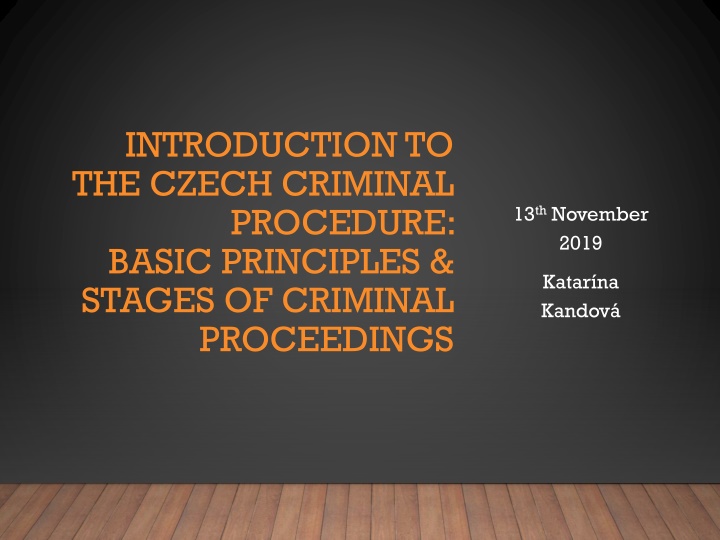


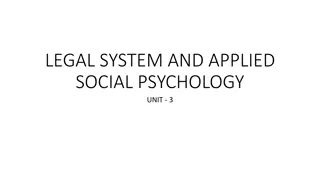

![Briefing on the Criminal Procedure Amendment Bill [B12-2021] to the Portfolio Committee on Justice and Correctional Services](/thumb/157093/briefing-on-the-criminal-procedure-amendment-bill-b12-2021-to-the-portfolio-committee-on-justice-and-correctional-services.jpg)
